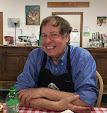Giving peace a chance
COULD 2006 be the year? Could this be the year we talk about peace? Out loud? To each other?
It's not that we don't think about peace. Many of the holiday cards we send include wishes for peace. We sing about it, too. John Lennon's "Imagine" is sung at many a New Year's Eve event.
But the truth is that we don't talk much about it. For example, peace is one of those topics which gets little discussion in our schools. Our study of history is primarily anchored by wars. Very little attention is given to the years between the wars.
Another example: Did you study peace in college? Or ever take an adult education class devoted to peacemaking? It's not likely. There are only a few peace studies courses in the entire US. And even fewer peacemaking courses in adult education programs.
OUR OWN field, social work, was founded by women and men who devoted much energy to peacemaking - from the neighborhood to the world. Jane Addams received the Nobel Peace Prize for her extraordinary peacemaking efforts. Addams and others founded the Women's International League for Peace and Freedom. Jeannette Rankin, another early social worker, devoted her Congressional career to seeking foreign policy alternatives to war.
But very little of this history makes its way into social work classes. Policy courses and textbooks devote little time and space to social work's legacy of peacemakers. Community practice courses spend little time on peacemaking.
I don't think this neglect of peace studies comes from a belief that war is preferable.
Rather, I believe it comes from the idea that peace is impossible. One look around our planet offers plenty of evidence for that view. There are so many wars in so many places.
Also, a significant share of the US economy is dependent on war. Our country is the leading arms merchant in the world.
But those things will not change unless we talk about alternatives to war. Let's make this year the year we talk about peace. We can look back at social work's founding mothers and fathers for some inspiration. We can look at others who spent their lives seeking peace instead of waging war, from Martin Luther King to Nelson Mandela, from Cesar Chavez to Dorothy Day.
We can also challenge the exclusion of peacemaking from our classrooms and our communities. We can ask: Where are the peacemakers in our studies? Who are the peacemakers in our communities?
Finally, we can be inspired by the example of Bill Sackter. He is one peacemaker who has touched the lives of all who are reading this Newsletter. His life andspirit offer us a place to start on a journey of peacemaking.
TIME FOR MORE
COFFEE QUOTES
Coffee in England always tastes like a chemistry experiment
-- Agatha Christie
Never drink black coffee at lunch -- it will keep you awake all afternoon
- Jilly Cooper
Good coffee is like friendship: rich and warm and strong
- Pan-American Coffee Bureau
Free yourself from the slavery of tea and coffee
- William Cobbett


0 Comments:
Post a Comment
<< Home